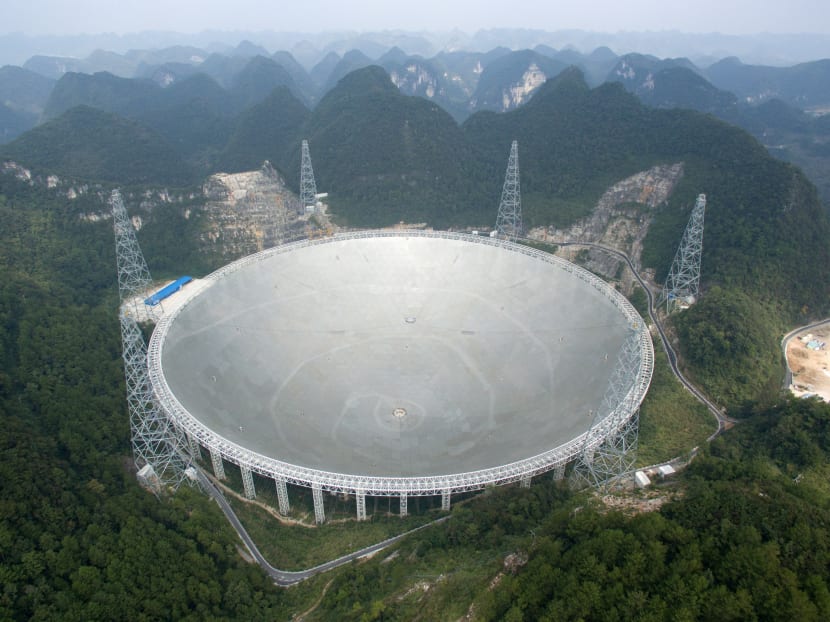Operator wanted for world’s largest telescope in China, but there’re no takers
BEIJING — China is offering more than US$1.2 million (S$1.63 million) to hire a foreigner to run the world’s largest radio telescope, but is struggling to find suitable applicants.

The Five hundred-metre Aperture Spherical Telescope. Photo: Reuters
BEIJING — China is offering more than US$1.2 million (S$1.63 million) to hire a foreigner to run the world’s largest radio telescope, but is struggling to find suitable applicants.
The Five hundred-metre Aperture Spherical Telescope, or Fast, is the world’s largest single-dish radio telescope, and it is looking for a chief scientist from overseas to oversee daily. Over the last few months, it encountered unexpected difficulties in finding a qualified and willing candidate as the job poses many challenges, according to people involved in the hiring process.
Whoever becomes Fast’s director of scientific operations will receive a financial package amounting to some US$1.2 million, a salary comparable with such a similar role in Western countries, and numerous benefits such as free housing.
Such financial incentives are becoming increasingly commonplace as many senior positions for scientists have opened up on the mainland and as the nation steps up its efforts to attract high-quality candidates for its rapidly growing research sector.
Fast is a giant dish located in the remote mountains of Guizhou, a province in south-west China. Guizhou has some of the nation’s largest caves and limestone hills. These features form depressions that naturally fit the shape of the dish – making it the ideal terrain for a giant telescope.
Its 500m dish can pick up previously undetectable signals from space and provide new clues to a wide range of questions, ranging from mysterious pulsar outbursts to the existence of intelligent alien life.
“Fast is a portal to new discoveries. For an astronomer, running Fast could be the opportunity of a lifetime,” said Dr Wang Tinggui, professor of astrophysics at the University of Science and Technology of China in Hefei, Anhui province.
It is worth noting that the Arelibo Observatory in Puerto Rico, with a dish less than half the size of Fast, has made many milestone discoveries, including one that helped to win a Nobel Prize.
The Chinese Academy of Sciences, which owns Fast, is casting its recruitment net overseas for an operator-in-chief because no astronomer at home had have the experience of running a facility of a similar scale and complexity.
“The post is currently open to scientists working outside China only. Candidates can be of any nationality, any race,” said a human resources official at the academy’s bureau of personnel, who is involved in the recruitment process.
A hiring notice was put up on the academy’s website in May. Advertisements were also placed on major international research job bulletins and senior scientists in research communities helped spread the message by word of mouth, according to the official.
“We cannot wait. We have also reached out to qualified scientists around the world through formal or private channels. These senior researchers do not browse job websites very often. We have done everything possible to communicate to them our offer,” said the official, who asked not to be named.
“What can be said at this stage is that we have encountered many challenges, and we are continuing with the efforts,” the official added.
According to the job description, the scientific operations director will be responsible for setting up and organising various academic committees to decide the telescope’s long-term scientific goals.
He or she will also be responsible for reporting major discoveries made by the telescope to the government every year, communicating with the general public about its work, and overseeing its budget.
The candidate must also have at least 20 years’ previous experience. He or she must have taken a leading role in large-scale radio telescope project and have plenty of managerial experience as well as holding a professorship – or equally senior position – in a world-leading research institute or university.
“These requirements are very high. It puts most astronomers out of the race. I may be able to count those qualified with my fingers,” said Dr Wang, who was director of the academy’s laboratory of galaxy cosmology, but was not involved in the management of Fast
Foreign astronomers of non-Chinese origin may face additional difficulties, he added.
Some Western researchers have plenty of experience running giant telescopes, but their expertise might not be fully tapped into in China due to language barriers and cultural differences.
The operator would face many technical uncertainties as well. Although Fast was completed last year, key components such as the signal receiver and thousands of movable reflection panels on the dish still require extensive testing and calibration.
The challenging nature of the work might require the chief operator to work long and irregular hours and give up his or her own research. The job will also involve living and working in one of China’s least developed areas.
“It is not a job for a scientist. It’s for a superhero,” Dr Wang stressed.
Several scientists working at the Fast facility declined comment due to the sensitivity of the issue. One of them said the decision to hire from overseas was made at the top and commenting on it could lead to political trouble.
A Beijing-based astronomer said if the headhunting process hits a wall overseas, the authorities should open the post to domestic applicants.
“We built the telescope with people at home. Why can’t we trust them to run it?” added the researcher, who asked not to be named. SOUTH CHINA MORNING POST





